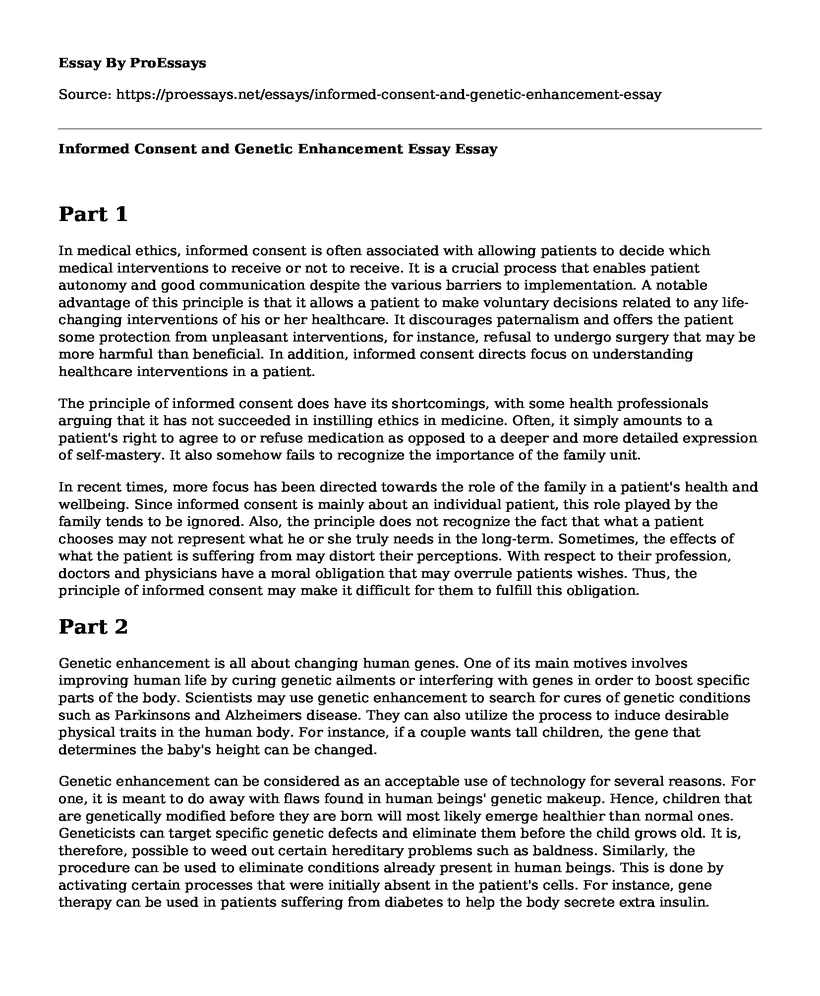Part 1
In medical ethics, informed consent is often associated with allowing patients to decide which medical interventions to receive or not to receive. It is a crucial process that enables patient autonomy and good communication despite the various barriers to implementation. A notable advantage of this principle is that it allows a patient to make voluntary decisions related to any life-changing interventions of his or her healthcare. It discourages paternalism and offers the patient some protection from unpleasant interventions, for instance, refusal to undergo surgery that may be more harmful than beneficial. In addition, informed consent directs focus on understanding healthcare interventions in a patient.
The principle of informed consent does have its shortcomings, with some health professionals arguing that it has not succeeded in instilling ethics in medicine. Often, it simply amounts to a patient's right to agree to or refuse medication as opposed to a deeper and more detailed expression of self-mastery. It also somehow fails to recognize the importance of the family unit.
In recent times, more focus has been directed towards the role of the family in a patient's health and wellbeing. Since informed consent is mainly about an individual patient, this role played by the family tends to be ignored. Also, the principle does not recognize the fact that what a patient chooses may not represent what he or she truly needs in the long-term. Sometimes, the effects of what the patient is suffering from may distort their perceptions. With respect to their profession, doctors and physicians have a moral obligation that may overrule patients wishes. Thus, the principle of informed consent may make it difficult for them to fulfill this obligation.
Part 2
Genetic enhancement is all about changing human genes. One of its main motives involves improving human life by curing genetic ailments or interfering with genes in order to boost specific parts of the body. Scientists may use genetic enhancement to search for cures of genetic conditions such as Parkinsons and Alzheimers disease. They can also utilize the process to induce desirable physical traits in the human body. For instance, if a couple wants tall children, the gene that determines the baby's height can be changed.
Genetic enhancement can be considered as an acceptable use of technology for several reasons. For one, it is meant to do away with flaws found in human beings' genetic makeup. Hence, children that are genetically modified before they are born will most likely emerge healthier than normal ones. Geneticists can target specific genetic defects and eliminate them before the child grows old. It is, therefore, possible to weed out certain hereditary problems such as baldness. Similarly, the procedure can be used to eliminate conditions already present in human beings. This is done by activating certain processes that were initially absent in the patient's cells. For instance, gene therapy can be used in patients suffering from diabetes to help the body secrete extra insulin.
There are instances when genetic enhancement is not considered an acceptable use of technology. The procedure is sometimes perceived as interfering with the processes of the human body. Some people are of the opinion that this is not the kind of science that humans should pursue. It would be much better to assume that what nature gave humans in the first place is good enough. Genetic enhancement also triggers discussion about compliance. Babies that have been genetically altered have no say to what is done to their bodies before they are born.
References
Grady, C. (2015). Enduring and emerging challenges of informed consent. New England Journal of Medicine, 372(9), 855-862.
Haus Keller, M. (2014). Better humans?: Understanding the enhancement project. Routledge.
Cite this page
Informed Consent and Genetic Enhancement Essay. (2022, Jan 04). Retrieved from https://proessays.net/essays/informed-consent-and-genetic-enhancement-essay
If you are the original author of this essay and no longer wish to have it published on the ProEssays website, please click below to request its removal:
- Moral Concerns and Committing Suicide Essay Example
- Intervention for Children With Synethesia: The Girl Who Heard Colors Essay
- Evidence-Based Practice and the Spradley's and the Lewin's Theories of Change
- Essay Sample on Child Anemia: Causes, Symptoms & Treatment
- Leadership in Nursing: Theories & Application - Essay Sample
- Paper Example on Living Healthily with Diabetes: Self-Management Tips
- Decreasing Cardiovascular Risks with Bariatric Surgery - Essay Sample







